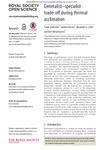Please use this identifier to cite or link to this item:
http://lib.hpu.edu.vn/handle/123456789/22287Full metadata record
| DC Field | Value | Language |
|---|---|---|
| dc.contributor.author | Seebacher, Frank | en_US |
| dc.contributor.author | Ducret, Varlérie | en_US |
| dc.contributor.author | Little, Alexander G. | en_US |
| dc.date.accessioned | 2016-07-18T06:49:10Z | |
| dc.date.available | 2016-07-18T06:49:10Z | |
| dc.date.issued | 2015 | en_US |
| dc.identifier.other | HPU4160443 | en_US |
| dc.identifier.uri | https://lib.hpu.edu.vn/handle/123456789/22287 | en_US |
| dc.description.abstract | The shape of performance curves and their plasticity define how individuals and populations respond to environmental variability. In theory, maximum performance decreases with an increase in performance breadth. However, reversible acclimation may counteract this generalist–specialist trade-off, because performance optima track environmental conditions so that there is no benefit of generalist phenotypes. We tested this hypothesis by acclimating individual mosquitofish (Gambusia holbrooki) to cool and warm temperatures consecutively and measuring performance curves of swimming performance after each acclimation treatment. | en_US |
| dc.format.extent | 9 p. | en_US |
| dc.format.mimetype | application/pdf | en_US |
| dc.language.iso | en | en_US |
| dc.subject | Biology | en_US |
| dc.subject | Physiology | en_US |
| dc.subject | Evolution | en_US |
| dc.subject | Performance curves | en_US |
| dc.subject | Locomotor performance | en_US |
| dc.subject | Performance breadth | en_US |
| dc.subject | Individual variation | en_US |
| dc.subject | Environmental variability | en_US |
| dc.title | Generalist specialist trade off during thermal acclimation | en_US |
| dc.type | Article | en_US |
| dc.size | 474KB | en_US |
| dc.department | Education | en_US |
| Appears in Collections: | Education | |
Files in This Item:
| File | Description | Size | Format | |
|---|---|---|---|---|
| 0326_Generalistspecialist.pdf Restricted Access | 474.29 kB | Adobe PDF |  View/Open Request a copy |
Items in DSpace are protected by copyright, with all rights reserved, unless otherwise indicated.
